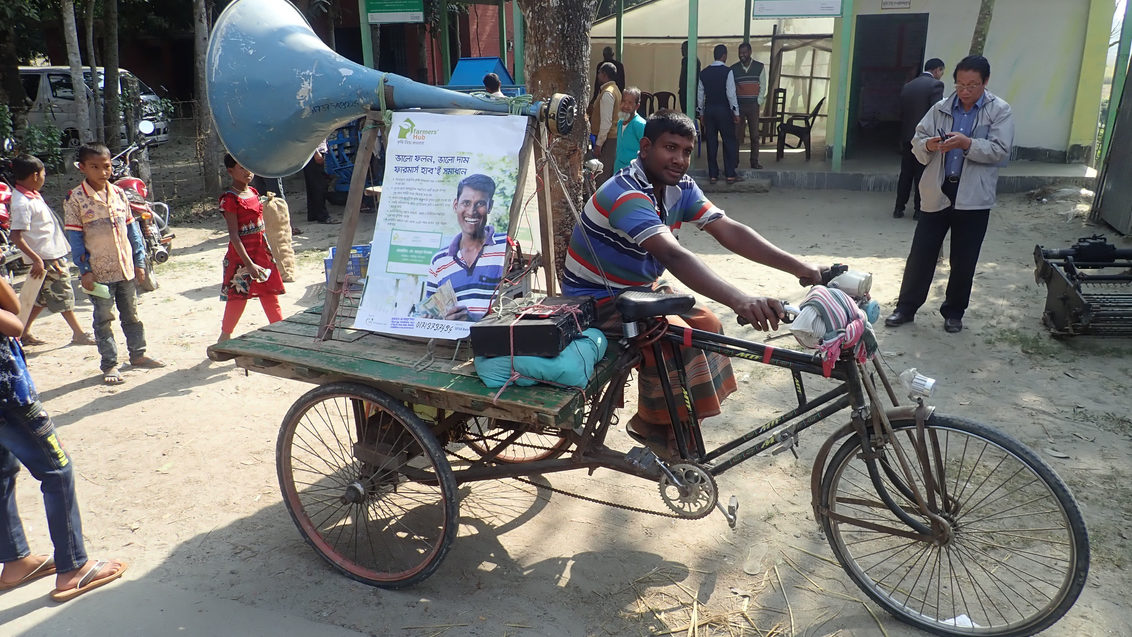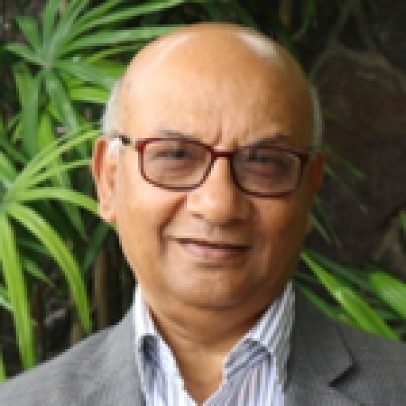Bangladesh: Commercial Development of Agricultural System

An interesting thing about the Agri-Business Center is that many young entrepreneurs are now choosing modern agriculture, especially high-value fruit gardening, as a profitable and reputable profession, not running for a job. It is hoped that the agribusiness center or Farmers’ Hubs will expand further as a modern concept of agribusiness.
“If the father is good, so is the son; if the mother is good, so is the daughter; if the cow is good, so is the milk; if the milk is good, so is the butter”. This local proverb coincidently matches with the innovative idea of the 'Farmers' Hub' in the process of commercialization of agriculture. We propose to re-phrase the ‘Farmers’ Hub’ in Banglali word 'Krishi Babsha Kendra’- meaning in English as ‘Agri-Business Center’. Our farmers have to think: what kind of crop to plant, where to get good seeds from, which method can be followed to make good profit, and so on. The idea of the agribusiness center has brought some practical approaches in this regard. Agribusiness Center is a local business venture; its owner provides good quality seeds, fertilizers, and other materials, rent out farming machinery and modern irrigation supply, etc. to the farmers on a commercial basis at an affordable price.
Agri-Business Center also provides hands-on training to its customer farmers on crop-wise planting-sowing techniques along with the right doses of inputs or materials to be used. Farmers can easily get production and marketing-related information from these centers. After the harvest, the farmers living in the proximity brought their produce to the premises of the agribusiness center to sell or channel to the markets. Agri-Business Centers also provide necessary transportation supports to the farmer's on-demand basis. The center has the provisions of sorting, grading, washing, packaging and measuring the crops digitally. The owner of the agribusiness centers then communicates and negotiates with large traders and arotdars (commission agents) to sell the large volume of aggregated produce at a good price. Separately, it is not possible for a farmer to gain from the bargaining with large traders, however, farmers get a higher price than the market once they channel their produce through agribusiness center.
Farmers' groups are formed in view of commercialization and necessary training is arranged. Agri-Business Centers are established in some particular places. Usually, the establishment starts with tin sheds and semi-structured infrastructure. Later, it becomes a full Hub structure with the increasing income and financial capability of the owner. The construction costs of this Agri-Business Center are primarily expensed by the owners including land and initial capital. However, initial investment support for establishing a center can be provided from the development fund at the initial stage, if possible. Conceptually, it keeps in mind getting a quick return of the initial investment during business planning. Otherwise, the owner of the Agri-Business Center will not be attracted to the investment and may lose interest in the business immediately. Therefore, at-least one quick revenue earning business venture is considered during the initial stage of the business so that profit can be generated within three to four months of starting the business. In the meantime, there have been some encouraging examples of Agri-Business Centers.
A Swiss-based international organization, Syngenta Foundation brings this agribusiness concept to the country at first. Already, it has given the privilege to establish and run 120 ‘Agri-Business Centers' in the greater Rajshahi and Rangpur region successfully. One such prospective initiative is the Tasfia Farmer's Hub in Gomstapur under Rajshahi district. Abdur Rashid, a young man is the owner entrepreneur of this hub. Less-educated. A total of BDT 4 lakh has been spent on setting up the hub infrastructures, a nursery for fruits and vegetables, and farm machinery for this Agri-Business Center. The entrepreneur invested BDT 2.5 lakhs and rest provided by Syngenta Foundation as a grant from its donor-funded project. 40 feet by 60 feet shed, about half of it is open for farmers’ meeting, training, and sorting, grading, aggregation and selling of farm produce as when needed. He has total of 7 acres cultivable land, about half of which is for mango orchard, the rest half is paddy and other crops. According to the Syngenta Foundation, even an entrepreneur can start a Farmers’ Hub business with an initial investment of only BDT 45,000.
Considering the quick return from the Agri-Business Center as mentioned above, Tasfia Hub chose the vegetable and fruit seedlings production and marketing as their first business initiative. Syngenta Foundation provides them hands-on training on the latest technology of soilless seedling production of vegetables, such as hybrid eggplant, bottle gourd, chili, tomato and fruit saplings e.g. papaya, mango, guava, and etc. It introduced soilless seedling production technology by using on cocopit. It helps to grow plants vigorously and has less chance of attack by diseases. It produces special qualities Amrapali mango sapling which is being used for developing new ultra-high density mango orchard in Barind area of Rajshahi region with the funding support from The Coca-Cola Foundation. The mango saplings planted in this method are small height and nearly heady, and they are planted at 6 feet by 9 feet density, thus reducing the cost of garden care. This method is becoming very popular, called UHDP or Ultra-High Density Plantation method. Hub nurseries are also doing good business by selling the mango seedlings. Within 4 months of starting, the Agri-Business Center has earned BDT 120,000 by selling chili seedling @ BDT 1.2, Ash Gourd and eggplant seedlings @ BDT 5, and Amrapali mango seedlings @ BDT50. For setting up Agri-Business Centers, entrepreneurs are being encouraged by starting nursery business as a primary investment and gradually include other businesses in the hubs.
An interesting thing about the Agri-Business Center is that many young entrepreneurs are now choosing modern agriculture, especially high-value fruit gardening, as a profitable and reputable profession, not running for a job. One such youth entrepreneur is S.M. Sarwar Hossain, who did his Masters in Agriculture, he lives in Tilahari area under Godagari upazila of Rajshahi district. He established a Farmers’ Hub in one hectare of land that he inherited from his father. He is also assisted by the Syngenta Foundation, the Coca-Cola Foundation in finance, and the WRG2030 in overall coordination. This Farmers’ Hub agribusiness center has already organized 400 farmers in his locality. He established a demonstration mango orchard of Himsagar, Amrapali and Khirshapati mango varieties following UHDP technologies and adopting a drip irrigation system as water-efficient technology. Apart from demonstrating his modern mango orchard to the member farmers, he also provides quality mango saplings, training and technical supports in establishing new orchards from this agribusiness center. He also set up a vegetable and fruit nursery at the Hub with the hope of getting a quick return on his investment. This young agriculture graduate entrepreneur focuses on paddy cultivation after doing a job for some time. But he switched from paddy cultivation to mango orchard due to low and price fluctuation of paddy and labor crisis. Here, he is very keen to establish modern and highly productive ultra-high-density mango gardening instead of traditional mango orchard from the commercial point of view. In addition to mango, he also plans to expand his orchard for litchi, guava, spices and other high-value crops.
Another important aspect of the Agri-Business Center is to promote water-efficient technology in agriculture wherever possible. Shifting of cultivation from rice to orchard will naturally save water. It is profitable too. In that case, two methods are being suggested here. Firstly, it is suggested to use drip irrigation or watering in drops to the fruit garden. The drip set can be easily fabricated by using plastic pipes and small tubes, and it is also easy to use. It doesn't cost that much. Since it irrigates at the root of the tree in drops as per requirement, it saves a lot of water and reduces irrigation cost at least half of the traditional cost. Secondly, it applies irrigation in the paddy field by alternate wetting and drying methods. In English, it is called AWD or Alternate Wetting and Drying method. To promote the technologies, Farmers’ Hub provides special plastic perforated pipes that have been placed in the paddy field to understand the water requirement by looking at the water level inside the pipe and it can thus make the right decision about the quantity and timing of irrigation. Agri-Business Centers are popularizing these water-saving technologies in agriculture. The Department of Agriculture Extension has introduced this method earlier but this is yet to be popularized at farmer level. Agri-Business Centers are supporting farmers to transform from traditional mango gardening to commercial ultra-high-density mango gardening in Rajshahi division by providing training and technical supports on establishing modern mango orchards with economic benefits, agronomic practices, quality saplings/seedlings, marketing, and business information. It is hoped that the Agri-Business Centers or Farmers’ Hub will expand further as a modern concept of agribusiness in the country.

Dr. M A Sattar Mandal
Emeritus Professor and Former Vice-Chancellor of Bangladesh Agricultural University, Mymensingh, Bangladesh.
- This is a translated version of the author’s article ‘Krishi Babosther Banijjik Bikash’, published in the daily Prothom Alo, dated 29 October 2019. The original version of the article is available here
